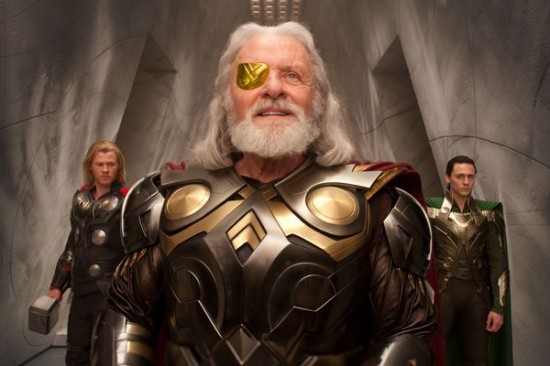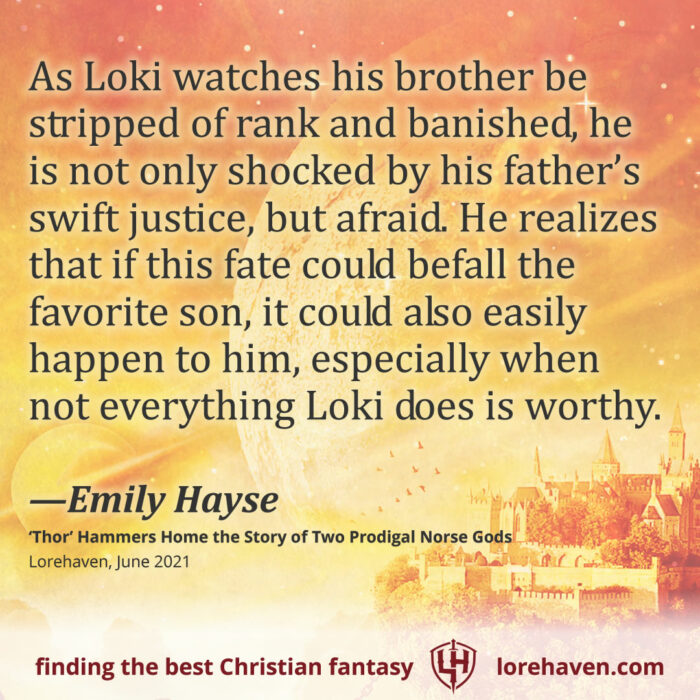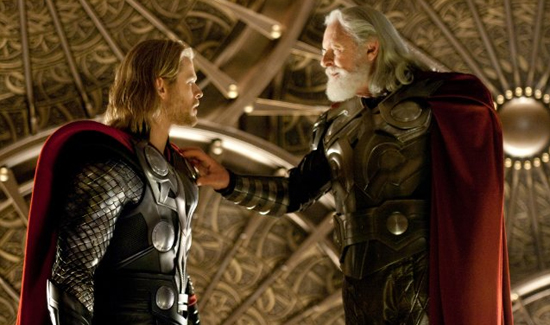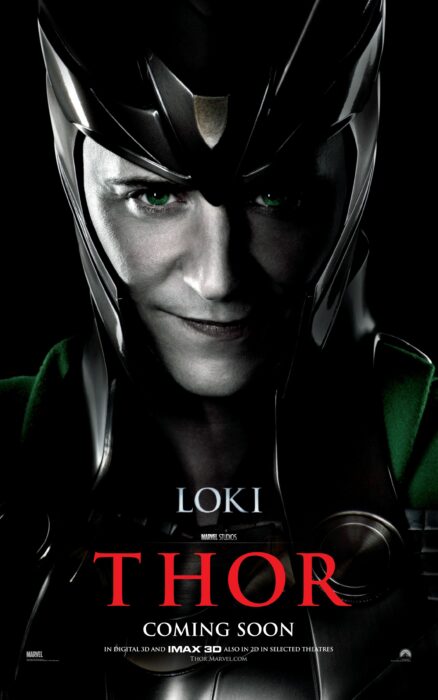‘Thor’ Hammers Home the Story of Two Prodigal Norse Gods
One of my favorite films from the last ten years is Marvel’s Thor (2011). Every time I watch it, I notice more depth, contrast, and themes from classic stories.
The film’s director, Sir Kenneth Branagh, said he wanted Thor to draw on old stories to tell this new one. The result? Thor transcends the superhero genre. It is a masterpiece of storytelling, fitting its genre while at the same time attaining a depth usually reserved for a literary film.
‘There was a [Norse god] who had two sons…’
Thor begins much like the parable of the prodigal son (Luke 15:11–32): “There was a man who had two sons …” Thor is bold and boastful. Loki is quiet and quick to look for his father’s approval. Immediately you see the contrast between them.
Cut to the two boys as adults and you see them not much changed: Loki is quiet and possesses perhaps minor flaws, while Thor’s arrogance and immaturity is on display for everyone, egged on by his friends’ admiration.
When Asgard suffers a minor attack that disrupts Thor’s coronation, Thor reacts like a child, throwing a tantrum and calling others names. He is only pacified by getting what he wants—a clandestine trip to the ice world of Jotunheim, which is forbidden. Like the Prodigal Son, Thor in his arrogance has decided that he is a man, yet proves himself just the opposite by his actions. He seeks to take what he wants, despite the hurt it brings to his father and to his kingdom.
In Jotunheim, Loki by far seems the brother with the most reason. He tries to talk Thor out of starting a fight, and uses his smooth-tongued skills to draw both parties back from the brink of conflict. Even the king of the Frost Giants correctly describes Thor when he says, “You’re nothing but a boy, trying to prove himself a man.” A fight ensues, and they are only saved from death when Odin appears and takes control of the situation as king—an intervention only because Loki had the foresight to send word for Odin to come and stop Thor.

‘I, Odin Allfather, cast you out!’
Thor is brought back from Jotunheim like a chastened boy, and he reacts with all the immaturity he has previously displayed. He calls his father names and proves he does not understand the responsibilities of leadership. As a result, Odin banishes him:
Thor Odinson, you have betrayed the express command of your king. Through your arrogance and stupidity, you’ve opened these peaceful realms and innocent lives to the horror and desolation of war! You are unworthy of these realms, you’re unworthy of your title. You’re unworthy—of the loved ones you have betrayed! I now take from you your power! In the name of my father and his father before, I, Odin Allfather, cast you out!
As Loki watches his brother be stripped of rank and banished, he is not only shocked by his father’s swift justice, but afraid. He realizes that if this fate could befall the favorite son, it could also easily happen to him, especially when not everything Loki does is worthy. Loki’s fear is wrongly compounded by his own pride when he learns he himself was born on Jotunheim. He’s half-Jotun: half Frost Giant.
 This truth about Loki’s heritage deeply shakes him, and he fears this is why Thor was chosen to be king. Now, with Thor gone, when Odin falls into deep sleep, Loki receives the kingdom. But he does not allow this gesture of trust to lead to his repentance from his own misdeeds. Instead, he abuses his power and uses it to further deepen his manipulation of events.
This truth about Loki’s heritage deeply shakes him, and he fears this is why Thor was chosen to be king. Now, with Thor gone, when Odin falls into deep sleep, Loki receives the kingdom. But he does not allow this gesture of trust to lead to his repentance from his own misdeeds. Instead, he abuses his power and uses it to further deepen his manipulation of events.
Meanwhile on Earth, Thor stubbornly seeks out his hammer, Mjolnir, thinking this is the way to restore himself to his place without his father’s help. But when he finds Mjolnir, he also finds that he cannot lift it. He is no longer worthy.
‘But when he came to himself …’
Thor now finds true repentance. Like the Prodigal Son at his lowest point, he thinks immediately of his father. When Loki comes to visit Thor, Thor asks if he may speak to his father. He’s ready to come home on Odin’s terms. He’s sorry and he says so.
Loki, bearing responsibility on his shoulders, and standing in Thor’s envied place as a leader, confronts a choice. With one sentence or two, he could heal most of the rift that has divided his family. Instead, he persists in unrepentance. He lies to Thor and uses his leadership to further hurt his family. He tells Thor he can never return home, and leaves his brother stranded as a mortal on Earth.
Loki then returns to Asgard and plans a double-sided scheme. He tells Laufey, king of Jotunheim, that he will let him into Asgard to kill Odin, all while planning to kill Laufey and use the attack as an excuse to destroy Jotunheim. Loki is concerned only with appearances. For him, these are enough to justify anything.
Finally, Loki sends a weapon called the Destroyer to kill Thor and ravage the New Mexico town in which he’s been staying. Thor, facing the Destroyer, takes greater steps in reconciliation. He takes full responsibility for his pride and his arrogance and the hurt he has caused. He reaches out to his brother, offering to sacrifice himself. This gives Loki another chance to repent and bring restoration to the family, but again Loki refuses. However, in sacrificing his life for his friends, Thor has become worthy. His father’s extended grace, even as he cast out his son, is revealed. Thor is restored, worthy not only of the hammer but of ruling Asgard.
 ‘But he was angry and refused to go in …’
‘But he was angry and refused to go in …’
Thor returns to Asgard, only to find Loki deep in conspiracy and genocide. Loki’s justification? “To prove to father that I am a worthy son.” Like the older brother in Jesus’s parable, Loki cannot stand to see grace and forgiveness so quickly extended to his brother who transgressed so greatly. If anything, his father’s grace and deep forgiveness should give Loki hope. Instead, these gifts drive Loki mad. He chooses to maintain his position of “good son” by any means necessary. Others’ well-being and restoration means nothing to Loki in his blind quest to justify himself.
Thor cannot stand by while his brother takes innocent lives, and a fight ensues. It’s ended as Thor destroys the bridge, another act of self-sacrifice, to save the Jotuns.
To the last, Loki maintains his self-justification. As he hangs by one hand over the rainbow bridge’s edge , he shouts, “I could have done it, Father—for you, for all of us!”
Very gently, his father tells him he is wrong.
Rather than repent, Loki lets go, falling to the unknown, and perhaps his death.
In the end, Thor’s own blatant rebellion leads to him seeing himself for what he is. He is restored after embracing repentance. But Loki, the outwardly obedient son, refuses to repent and accept his father’s grace towards his brother or himself.
And [the older son’s father] said to him, “Son, you are always with me, and all that is mine is yours. It was fitting to celebrate and be glad, for this your brother was dead, and is alive; he was lost, and is found.”
(Luke 15:31–32)
What’s the difference we see in the prodigal son parable and the story of Thor? It’s all about the heart. Every person needs mercy. But do we receive mercy with gratitude, or are we offended at the very idea being offered mercy? That makes the difference between our being saved and being lost.





























Wow! This is SO beautiful! Thor is also my favorite Marvel hero (aside from Captain America and Captain Marvel). I LOVE how you not only contrast Thor and Loki in using the Prodigal Son parable, but you also show Loki’s inward struggle as well. I’d at first harbored a very STRONG dislike towards Loki as the Marvel films progress, but reading this article definitely makes me feel sorry for him. He could’ve done better for himself as well as his relationship with his brother and adoptive father. Instead, his actions led to destruction.
I so adore Thor, especially in his redemptive arc to a spoiled and arrogant prince to a noble warrior-king. After Dark World, I was severely disappointed in how the later Marvel films portrayed him. (I hated Ragnarock). I wished they could’ve done better with his storyline and his homeworld.